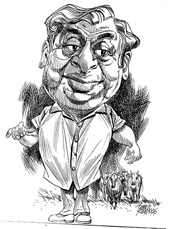|
|
Blame it on his joining work on Friday the 13th or on his trademark feistiness, Dr Verghese Kurien’s six-decade long career has been interspersed with turbulence. Whether for his famous confrontations with bureaucrats or politicians or recent spats with his prot?g? and successors, Kurien has been in the news for reasons other than his commitment to the cause. And now, his nomination for the new election to the chair of the National Cooperative Dairy Federation of India Ltd ? of which he is the present chairperson ? has been rejected by the returning officer. Will the 85-year-old veteran of the cooperative movement get into war mode again?
This time, however, he intends to surprise those who have been accusing him of hanging on to his chair for too long. “My nomination was rejected on unfair grounds. But I see no point in continuing or pressing for nomination again,” he says. Is that a clear signal that he’s retiring? He’s cryptic but does not deny it. “I’m old and I may consider retirement very soon. It could be within a year, it could be within the next six months,” he says.
That would be the end of a glorious career spanning over five decades of economic planning. Verghese Kurien started his career in an India ruled by the British, at the time of the Second World War. Belonging to a rare lot of engineers from the Madras College of Engineering ? then the only engineering college in the south ? he had the option of choosing between the British Government and the British Army. “My mother tore up the offer letter from the Army and I had no choice but to join the government,” he chuckles.
The first job for Kurien, after his internship with Tata Steel, landed him in a government-run creamery in Anand. It wasn’t fate, however, but a government contract that actually saw Kurien ?who had been born in a Catholic family in Kerala, but had spent most of his childhood in Tamil Nadu, where his father was posted as a medical officer ? take up the job in a remote, backward and agrarian village in Gujarat. The contract gave Kurien a government scholarship to the Michigan School of Engineering, on the condition that he returned to Anand.
That’s where the life of the America-returned engineer encountered a turning point. He met Tribhuvan Das Patel, the leader of the local farmer’s movement who not only rented out his garage to a meat-eating bachelor but also inspired him to strive for the empowerment of the farmers ? a goal that became his passion for over half a century. The young engineer joined Patel’s movement and never looked back. He later founded the Gujarat Co-operative Milk Marketing Federation (GCMMF) and the National Dairy Development Board (NDDB), which he headed till 2001.
Detractors have often accused him of “not letting go”. But Kurien’s justification has been the lack of suitable successors committed to the idea of cooperative development. And that, he says, has been the cause of the biggest disappointment in his life. Even when he chose Amrita Patel, his prot?g? of many years, to take over as chairperson of the NDDB from him, he declares to have felt “let down”. “To me, a cooperative is a result of faith. Faith is a result of belief without reason. I don’t think Amrita had that kind of belief, or even a similar kind of belief I chose to build my life around,” he says. “I should have been more careful in choosing my successor.”
An avowed MNC-basher, Kurien believes the Anand model can be replicated in other industries such as edible oil (in which Amul forayed with its brand Dhara), sugar and also power. “But I wonder if there are enough young people left out there to take up this cause,” he says.
Kurien himself had to put up with a salary considered quite meagre for qualified engineers. “You can’t support a big family on a government salary,” he states. Starting with a salary of Rs 275 a month (he says he got married only when his salary increased to Rs 600), he claims to have never pocketed a salary of more than Rs 20,000. Not that he had to do without the little comforts and excesses, which he attributes to the numerous cash awards he won over the years. Apart from the Padma Shri, Padma Bhushan and the Krishi Ratna Award, he has won international awards such as the Ramon Magsaysay award and Wateler Peace Prize Award of the Carnegie Foundation. The World Food Prize Award, he says, left him richer by $2,00,000.
Kurien had no qualms about receiving prize money, for he also believes in having fun. Often described as a Gandhian unlike a Gandhian, he enjoys a sundowner, and even believes in letting his hair down once in a while.
Back in the good old days, whenever as a carefree bachelor he needed to have “some fun and mischief in life,” he used to head for Mumbai. Today, Kurien’s idea of relaxation has simmered down to listening to western classical music after a long day’s work. Perhaps Kurien’s retired life plan will include listening to Bach and Mozart in the backwaters of Kerala, his favourite drink by his side. And, no, it’s not likely to be a glass of milk.











